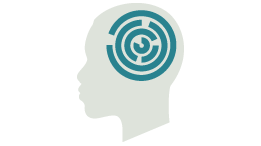COMMON ELEMENTS
CETA includes the following elements that can be used individually or in combination to address behavioral and mental health problems in adults and youth.
engagement & education
This element includes psychoeducation on typical behavioral and mental health-related problems and techniques (e.g., normalization of such feelings) to decrease stigma, increase treatment buy-in, and provide clients with information on how services can help them with their problems.
Cognitive Coping & Restructuring (Think Differently)
There are some situations in life that we cannot change, but we can change how we think about the situation in order to feel better and not get “stuck” in unhelpful emotional and behavioral patterns. This element includes helping clients to change unhelpful thoughts (e.g., “Things will never get better”).
BEHAVIORAL ACTIVATION
Often when people are in stressful situations, they stop taking care of themselves and stop engaging in enjoyable activities. This element includes helping clients change their daily behaviors in order to feel better.
Confronting Fears & Trauma Memories
Many people experience very scary, dangerous events that result in memories that cause high distress (e.g., nightmares, flashbacks). This element includes helping clients think and talk about trauma memories with less distress.
Safety Assessment & Planning
Many individuals have thoughts of hurting themselves/others and/or face unsafe situations in their homes or communities. This element includes assessing the severity of safety issues as well as safety planning to reduce the likelihood of harm.
Substance Abuse Intervention
Using substances can negatively impact people’s functioning. This element includes the assessment of current substance use as well as helping the client learn strategies to meet their substance reduction goals.
Problem-Solving
Problems can feel overwhelming and impossible to solve. This element helps clients to solve their problems, increases feelings of agency, and often decreases unhelpful emotions (e.g., frustration, sadness) around the situation.
Anxiety Management
People sometimes fear things that are actually safe and may experience tension in the body when they are anxious. This element helps the client to gradually face the fear without anxiety and learn multiple techniques (e.g., deep breathing, imagery) to reduce tension.
CAREGIVER SKILLS
Some children have behavioral problems. This element teaches caregivers different skills such as praise, consequences, special time/positive attention, selective attention, and many other behavioral management strategies.









